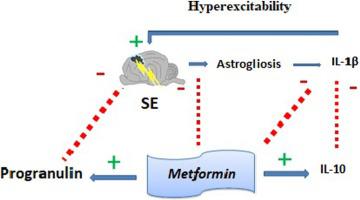当前位置:
X-MOL 学术
›
J. Chem. Neuroanat.
›
论文详情
Our official English website, www.x-mol.net, welcomes your
feedback! (Note: you will need to create a separate account there.)
The possible role of progranulin on anti-inflammatory effects of metformin in temporal lobe epilepsy
Journal of Chemical Neuroanatomy ( IF 2.7 ) Pub Date : 2020-11-01 , DOI: 10.1016/j.jchemneu.2020.101849 Somayeh Vazifehkhah 1 , Ali Mohammad Khanizadeh 1 , Tourandokht Balouchnejad Mojarad 1 , Farnaz Nikbakht 1
Journal of Chemical Neuroanatomy ( IF 2.7 ) Pub Date : 2020-11-01 , DOI: 10.1016/j.jchemneu.2020.101849 Somayeh Vazifehkhah 1 , Ali Mohammad Khanizadeh 1 , Tourandokht Balouchnejad Mojarad 1 , Farnaz Nikbakht 1
Affiliation

|
Temporal lobe epilepsy (TLE) is the most prevalent and drug-resistant form of parietal epilepsy. TLE is accompanied by neuroinflammation in the brain, which involves reactive glial cells. Metformin is an old antidiabetic drug with anti-inflammatory and neuroprotective effects. Considering the importance of inflammation in epilepsy, we have investigated the effect of metformin on astrogliosis markers as well as pro and anti-inflammatory cytokines and its effect on progranulin expression (an important neuroprotective protein in epilepsy) in a rat TLE model. TLE was induced by intracerebroventricular microinjection of kainic acid. Metformin was orally administered for two weeks before the induction of epilepsy. Astrogliosis markers (GFAP and S100B), as well as IL-1β and IL- 10 levels, were detected by ELISA. The progranulin level was measured by Western blotting and immunohistochemistry in the hippocampus. Our results showed basal levels of GFAP, S100B, and pro-inflammatory cytokine increased in the epileptic rats but were significantly ameliorated after pretreatment with metformin. However, anti-inflammatory cytokine and progranulin also increased in the pre-treated rats and metformin alone group. An increment in the progranulin level emphasizes the importance of this protein in epilepsy. Hence, metformin may exert at least some of its anti-inflammatory effects by increasing progranulin level. In sum, we have concluded that progranulin can be a key mediator in epilepsy, and the anti-inflammatory action of metformin in status epilepticus is through increasing the secretion of IL-10 and inhibiting IL-1 β and astrogliosis.
中文翻译:

颗粒蛋白前体对二甲双胍对颞叶癫痫抗炎作用的可能作用
颞叶癫痫 (TLE) 是最普遍和耐药性的顶叶癫痫形式。TLE 伴随着大脑中的神经炎症,其中涉及反应性神经胶质细胞。二甲双胍是一种古老的抗糖尿病药物,具有抗炎和神经保护作用。考虑到炎症在癫痫中的重要性,我们在大鼠 TLE 模型中研究了二甲双胍对星形胶质细胞增生标志物以及促炎和抗炎细胞因子的影响及其对颗粒蛋白前体表达(癫痫中重要的神经保护蛋白)的影响。TLE 是由脑室内显微注射红藻氨酸诱导的。在诱发癫痫之前口服二甲双胍两周。通过ELISA检测星形胶质细胞增生标志物(GFAP和S100B)以及IL-1β和IL-10水平。通过蛋白质印迹和免疫组织化学在海马中测量颗粒蛋白前体水平。我们的结果显示,癫痫大鼠的 GFAP、S100B 和促炎细胞因子的基础水平增加,但在用二甲双胍预处理后显着改善。然而,预处理的大鼠和单独的二甲双胍组的抗炎细胞因子和颗粒蛋白前体也增加。颗粒蛋白前体水平的增加强调了这种蛋白质在癫痫中的重要性。因此,二甲双胍可以通过增加颗粒蛋白前体水平来发挥至少部分抗炎作用。总之,我们得出结论,颗粒蛋白前体是癫痫的关键介质,二甲双胍在癫痫持续状态中的抗炎作用是通过增加 IL-10 的分泌和抑制 IL-1 β 和星形胶质细胞增生。
更新日期:2020-11-01
中文翻译:

颗粒蛋白前体对二甲双胍对颞叶癫痫抗炎作用的可能作用
颞叶癫痫 (TLE) 是最普遍和耐药性的顶叶癫痫形式。TLE 伴随着大脑中的神经炎症,其中涉及反应性神经胶质细胞。二甲双胍是一种古老的抗糖尿病药物,具有抗炎和神经保护作用。考虑到炎症在癫痫中的重要性,我们在大鼠 TLE 模型中研究了二甲双胍对星形胶质细胞增生标志物以及促炎和抗炎细胞因子的影响及其对颗粒蛋白前体表达(癫痫中重要的神经保护蛋白)的影响。TLE 是由脑室内显微注射红藻氨酸诱导的。在诱发癫痫之前口服二甲双胍两周。通过ELISA检测星形胶质细胞增生标志物(GFAP和S100B)以及IL-1β和IL-10水平。通过蛋白质印迹和免疫组织化学在海马中测量颗粒蛋白前体水平。我们的结果显示,癫痫大鼠的 GFAP、S100B 和促炎细胞因子的基础水平增加,但在用二甲双胍预处理后显着改善。然而,预处理的大鼠和单独的二甲双胍组的抗炎细胞因子和颗粒蛋白前体也增加。颗粒蛋白前体水平的增加强调了这种蛋白质在癫痫中的重要性。因此,二甲双胍可以通过增加颗粒蛋白前体水平来发挥至少部分抗炎作用。总之,我们得出结论,颗粒蛋白前体是癫痫的关键介质,二甲双胍在癫痫持续状态中的抗炎作用是通过增加 IL-10 的分泌和抑制 IL-1 β 和星形胶质细胞增生。











































 京公网安备 11010802027423号
京公网安备 11010802027423号